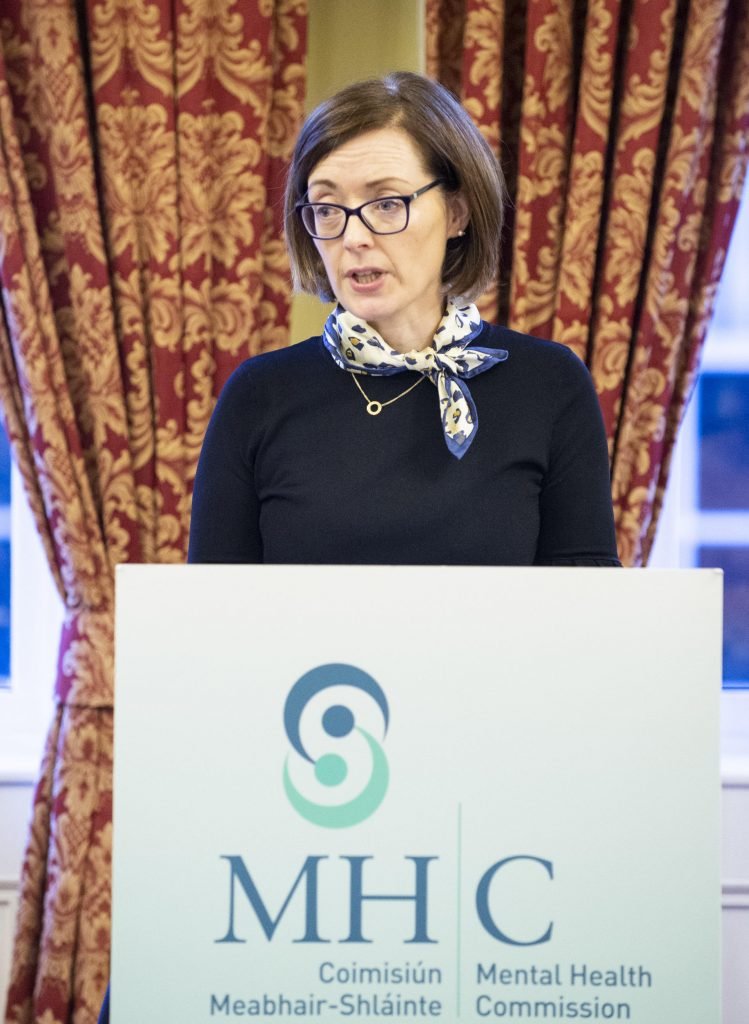Niamh Cahill speaks to Director of the Decision Support Service Ms Aine Flynn about why it is essential to reform Ireland’s assisted decision-making process and reports on delays in introducing the new service
On 2 October 2017, Ms Aine Flynn took over as Director of the Decision Support Service (DSS), based at the Mental Health Commission.
Since this time she has been working towards introducing the regulations outlined in the Assisted Decision-Making Capacity Act, passed into law on 30 December 2015.
To date, large parts of the Act, which reforms our outdated capacity legislation, have yet to commence, including the introduction of a DSS.

The new service is designed for all adults who have difficulties with decision-making capacity. This may include individuals with an intellectual disability, mental illness or acquired brain injury, as well as people with age-related conditions such as dementia, who require support to make decisions.
Crucially, it will enable people to exercise their human right to make their own choices, through the guiding principle of respect for “will and preference”, and allow people to have control over their decisions and ultimately, their lives.
Efforts are underway to establish the infrastructure to manage and oversee the new regulations. The task is a mammoth and complex one, which has hit more than a few roadblocks since Ms Flynn began her role as Director.
The slow pace of progress in introducing the service has been well documented to date. There was little change in this position at the beginning of the year (pre-Covid-19), with financial investment just one of a host of stumbling blocks to advancement.
Following the unprecedented public health emergency, there was undoubtedly concern that work on the project could ground to a halt completely. However, despite the crisis, work is continuing.
“We can reassure all our stakeholders and all those who will use the DSS that the team is continuing to work and plan for the commencement of the legislation and the implementation of the service, despite the current challenges,” said Ms Flynn in a recent statement.
Her team has been “mobilised to work remotely and the establishment of the project is continuing at pace”, she added.
Developments
A new website will launch shortly, providing information on the legislation, as well as ongoing progress updates on the implementation of the service.
Details on how individuals can register a decision support agreement, how these agreements will be monitored by the DSS, and how a person can make a complaint if they are unhappy with an agreement or a decision supporter, will also be provided via the website.
This year will also see the development of four distinct panels as set out under the Act to best support decision-making: Court friends; decision-making representatives; special visitors; and general visitors.
Furthermore, a communications plan, including a public consultation on draft codes of practice, will be developed.
The statement added: “Following recent positive engagement with the Department of Justice and Equality, the DSS is looking forward to agreeing a comprehensive time-bound costed plan for the commencement of the Assisted Decision-Making (Capacity) Act 2015 with a go-live date to which all stakeholders can commit.”
Notwithstanding the difficulties faced in the worldwide pandemic, therefore, Ms Flynn and her team intend to forge ahead with establishing the much-needed service.
Wardship
In an interview with this newspaper before the public health crisis, Ms Flynn outlined the enormous task ahead in delivering the service and in fostering a huge cultural shift among the public and healthcare professionals around the area of assisted decision-making.
Ireland is generally considered to be introducing a progressive and enlightened assisted decision-making model under the Act.
However, we are “late to the game” in relation to the development of a decision support service when compared to other countries, according to Ms Flynn.
The harsh, uncompromising, and often unjust wardship system has been in dire need of reform here for some time.
Recent legal challenges to the wardship system have concentrated attention on its inadequacies and may help spur the pace of reform, said Ms Flynn.
“Wardship in one form or another has been with us since medieval times; it used to reside in the powers of the crown, then it was transferred ultimately to the president of the High Court. But it’s still largely administered under the Lunacy Regulation Act of 1871,” Ms Flynn told the Medical Independent.
“Wardship has been subject to criticism for a long time. It wouldn’t be considered at all compliant with international human rights standards. It’s certainly not compliant with the UN Convention on the Rights of Persons with Disabilities and it has come in for a greater degree and analysis in our own courts more recently.”
Under the blunt approach taken by wardship, a person is simply found to be of unsound mind, lacking capacity to deal with their affairs.
In contrast, the functional capacity assessment provided for in new legislation ensures support to individuals when making decisions in a much more nuanced way, explained Ms Flynn. This is a move away from the “best interests” approach currently in practice.
“For example, if you inherit a house, under wardship if you have an intellectual disability you could be taken into wardship in order to deal with the inheritance. But by being taken into wardship, you can no longer make a host of other decisions; you can’t decide to travel, make medical decisions, get married,” said Ms Flynn.
“If you inherit a house under the new Act and you’ve an intellectual disability, it will look at the level of support that you require to deal with that matter, if indeed you lack a capacity to deal with it. The functional capacity test is the ability to understand the relevant information and the consequences of your decision. Can you understand the information, retain the information, weigh it up and communicate what you want to do? That’s considered much more nuanced and capable of coming up with solutions that are tailored to a person’s needs.”
Despite its obvious merits, however, the “decision supporting” approach presents several challenges for healthcare professionals, Ms Flynn cautioned.
“Promoting will and preferences and accepting that people may make unwise decisions, all the challenges that presents in terms of safeguarding; you’re dealing with healthcare professionals who might have a certain reticence about that, and fear exposure if they allow people to do what they want, and is that assuming a certain risk? There’s a considerable complexity to that. I think, mostly, people embrace this; they recognise the way we do things at the moment is not satisfactory and there’s a learning in it.”
The Department of Justice has estimated that in excess of 200,000-220,000 people could be beneficiaries of the Act. But given that “everyone should be planning ahead”, Ms Flynn believes this could be much higher.
This is because as well as establishing the DSS, the Act provides improved tools for advanced planning, allowing individuals to make an advanced healthcare directive, outlining treatments they would like to receive or refuse in the future, such as life-sustaining treatment, for example.
In the context of Covid-19, Ms Flynn is urging the public to consider advance healthcare planning that will enable everyone to articulate their wishes with regard to future medical treatment.
“In the current high-pressure climate, decisions around medical interventions are even more poignant and pressing,” she said in a statement on 30 April.
“We all have a right to be involved in decisions about our healthcare and treatment choices but when people become incapacitated, healthcare professionals administering acute care may have little knowledge of their wishes regarding treatment. This situation is further exacerbated due to the necessary distancing measures. Tragically, at their most vulnerable, people may be isolated from their usual support network, and from friends or family who can advocate for them and promote their wishes.”
Complex
Last year, Ms Flynn spoke to 50 organisations as part of plans to launch the service and enhance public awareness.
“It’s complex stuff and it will be a slow-burner for people to come to terms with the changes the Act introduces,” said Ms Flynn regarding the consultations.
The HSE’s assisted decision-making and consent team is supporting the changes by increasing public awareness.
In place since 2016, the team has done “a lot of work” in trying to introduce the basic principles of the Act and promote better practice, challenging the idea, for example, that “next of kin means something, when it doesn’t”, said Ms Flynn.
“The tenacious idea that your next of kin means something and has some kind of function and status as a decision-maker is just made up, and yet probably relied on a bit. Next of kin means something in succession law, and nowhere else, and yet it will appear in hospital admission forms routinely, as if that person is somebody who has to be consulted before a decision is made.”
‘External obstacles’
When the service commences, it is envisaged the DSS will employ 39 staff members. It currently has a team of nine.
The Commission has previously estimated that it requires funding of approximately €8.5 million in 2020 to ensure that the DSS will commence by the end of the year.
However, its launch this year now looks increasingly unlikely, given the lack of adequate investment to date, the public health emergency and delays in the formation of Government. Originally, a timeline of 2018 was attached to its introduction.
Mental Health Commission meeting minutes from 30 January reveal the challenges faced and highlight ongoing concern at the pace of developments.
According to the minutes, key issues relating to funding, the ICT project and governance had “not yet been fully addressed”.
The meeting minutes stated that “reference was made to the impact the delayed commencement is having generally — on the wider public as well as the DSS team within the MHC. It was agreed that there is a potential loss of momentum.”
The meeting heard of “a number of external obstacles to the DSS project” and that “the DSS is only part” of the Act.
“There is a lot for other parties to do in preparation for the 2015 Act and the DSS must operate within its remit and cannot be held responsible for the readiness of other parties.
“It was agreed that once the new Government is formed, that the Commission shall need to meet the new Minister as soon as possible.”













Leave a Reply
You must be logged in to post a comment.